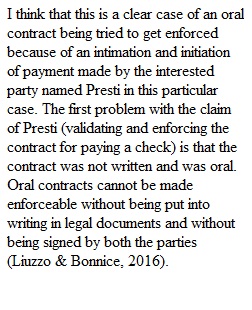


Q Wang orally agreed to sell a thoroughbred horse to Presti for $60,000. When Presti sent a check in payment, Wang told him that he intended to hold the check for a month for tax purposes. Wang retained possession of the horse. While the check remained uncashed, a disagreement arose between Wang and Presti. Wang announced that he would not go through with the transaction and that, since the contract was oral, it was unenforceable. Presti claimed that his sending the check was payment and this action made the oral contract valid and enforceable. Wang denied accepting payment. Is Presti's claim, that sending the check made the contract enforceable, valid? Reference pg. 203 for types of contracts that require a writing. When does the seller actually consummate this transaction? There is no memo and no writing. What is the significance of the concept that no goods and no payment has happened yet have to do with it? (in short, when is an acceptance and acceptance?)
View Related Questions